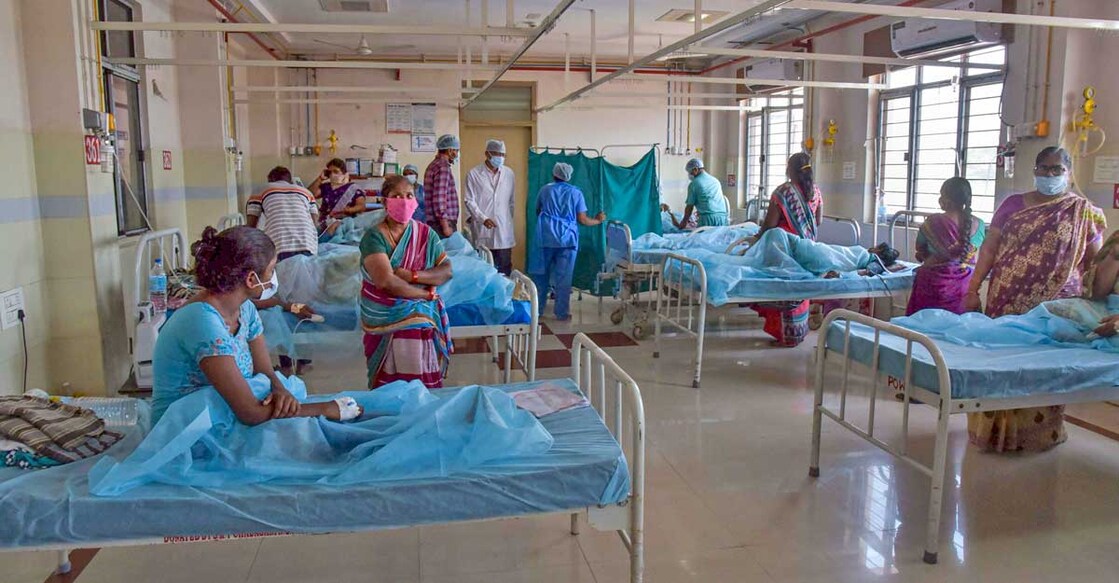Mystery illness that hospitalized over 600 in Andhra Pradesh

Mail This Article
Bengaluru: One person has died and 609 have been hospitalised since Saturday in Eluru city in Andhra Pradesh due to a mysterious infection that caused many to fall unconscious after suffering giddiness, seizures and nausea.
Deputy Chief Minister (Health) A K K Srinivas, who interacted with the victims in the Government General Hospital in Vijayawada, said 32 people were being treated in the District Headquarters Hospital in Eluru and another 21 in Vijayawada.
So far, 553 patients had fully recovered and been discharged from hospitals.
Though two patients died in the GGH, Vijayawada, on Thursday, the mysterious disease was ruled out as the cause.
"One woman was diagnosed with COVID-19 while another male died of heart attack," the Deputy Chief Minister said.
"We have found out that some of the patients, who were brought to Vijayawada from Eluru, were suffering from other ailments. Appropriate treatment is being provided to them," Srinivas added.
He said the various Central institutions were expected to submit on Friday their reports on the causative factors of the mysterious disease.
Based on the reports, necessary steps would be taken to ensure such disease outbreak did not recur.
The Deputy Chief Minister asserted that (contaminated) water was not the cause of the disease outbreak.
"Preliminary reports established that water contamination is not the cause but we are getting an in-depth analysis done. Eluru citizens need not panic and consume the drinking water supplied there. Extensive chlorination is also being done in all the overhead reservoirs to ensure water safety," Srinivas said.
What exactly happened?
The first patients were admitted to hospital on Saturday in Eluru, a town in Andhra Pradesh state.
By Sunday, according to the federal health ministry, there were more than 200 people hospitalised, suffering dizziness, headache and vomiting. Patients including children and women fainted, and that evening a 45-year-old man died.
By Wednesday, the number of patients had jumped nearly three-fold. As of Thursday, over 85% of the patients had been discharged.
The cause of their illness has yet to be identified. Tests ruled out COVID-19 infection.
What are the potential causes?
Eluru is home to over 200,000 people, and is known for its weaving industry.
Investigations have focused on whether the illness could be linked to some groundwater contamination, excessive use of pesticides or mass application of chlorine as part of a coronavirus disinfection drive.
Doctors have also found traces of lead and nickel in the blood samples of some patients. The elevated lead levels could have been a trigger, especially as the levels appeared to drop among patients a day after hospitalisation, doctors say.
The state government says officials are also checking if dumping or burning of used batteries could have caused the illness, without elaborating further.
They are also testing the area's drinking water and milk samples.
A senior health official has also said exposure to organochlorides found in pesticides and used in mosquito control could be a potential cause.
What are the effects of exposure to lead or chlorine
High levels of lead in the bloodstream can impair development of brains, nervous systems and vital organs such as heart and lungs.
Organochlorides are banned or restricted in many countries after research linked them to cancer and other health risks. It was not immediately clear how extensively the chemicals are used in India, though they are found in DDT used in mosquito control.
World Health Organization experts are surveying neighbourhoods in and around Eluru, collecting various information, including on food sources.
Health authorities are running various tests and the state's chief minister has promised corrective measures once investigations are completed.

